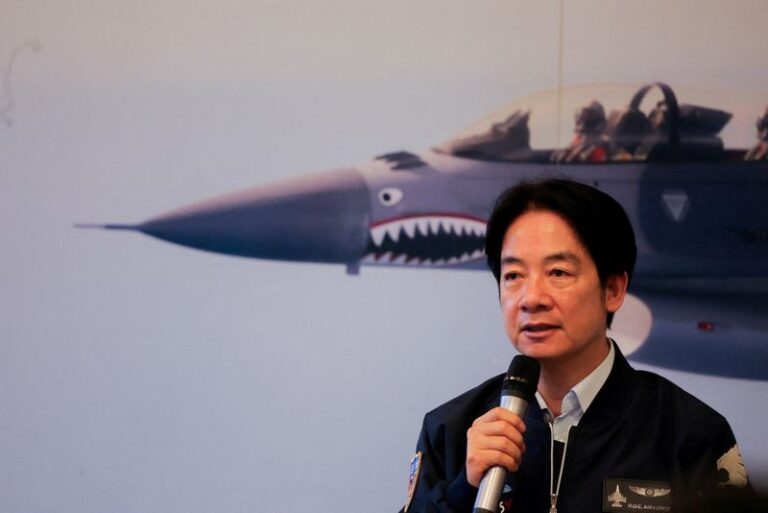Ben Blanchard
TAIPEI (Reuters) – Taiwan’s President Lai Ching-te said on Monday that democracy was not a crime and dictatorship was the real “evil” after China warned of the death penalty in extreme cases against “stubborn” Taiwanese separatists.
China, which considers Taiwan to be its territory, has made no secret of its dislike for Lai Ming, who took office last month, calling him a “separatist” and conducting military drills shortly after he took office.
China stepped up pressure on Taiwan on Friday by issuing new legal guidelines to punish those it says support formal Taiwan independence, but Chinese courts have no jurisdiction over the democratically ruled island.
Asked about China’s measures at a press conference at the Presidential Office in Taipei, President Lai first responded by reiterating his sympathies for the recent floods in southern China.
“I want to emphasize that democracy is not a crime. The real evil is dictatorship. China has absolutely no right to impose sanctions on the people of Taiwan because of the status they occupy. Moreover, China has no right to infringe on the rights of the people of Taiwan from across the border,” he said.
According to China, anyone who does not support “unification” is a supporter of Taiwan independence, Lai added.
“I call on China to face up to the existence of the Republic of China and engage in exchanges and dialogue with the legitimate, democratically elected government of Taiwan,” he said, using the island’s official name. “Failure to do so will only lead to further estrangement between Taiwan and China.”
The U.S. State Department also expressed concern about the Chinese threat on Monday.
“We strongly condemn statements and actions by Chinese officials that incite tensions and destabilize,” spokesman Matthew Miller told reporters about the People’s Republic of China. “Intimidation and legal warfare cannot peacefully resolve cross-strait differences.”
Chinese military flight
Taiwan said it had seen a sharp increase in Chinese military flights since Thursday after Beijing conducted “joint combat readiness patrols” near the island.
Taiwan said it had spotted 115 Chinese military aircraft operating nearby between Thursday and Sunday, coming as close as 31 nautical miles (57 kilometers) from the southern tip of the island.
Taiwan alleges that over the past four years China has conducted regular military activities around the island as part of its “gray zone” pressure campaign.
Taiwan’s annual Han Kuang military exercises next month aim to replicate actual combat as closely as possible, given the rapidly growing “enemy threat” from China, a senior Taiwanese government official said.
Lai rejects Beijing’s claims of sovereignty and says only the Taiwanese people can decide Taiwan’s future. He has made multiple requests to meet with China but has been rebuffed.
China claims that any move by Taiwan to formally declare independence would give it grounds to attack the island.
Taipei maintains that Taiwan is already independent as the Republic of China, whose government fled to Taiwan in 1949 after losing a civil war to Mao Zedong’s Communists, and has no intention of changing that.
Lai also faces challenges at home, with his Democratic Progressive Party (DPP) losing its parliamentary majority in the January elections that brought him to power.
At a press conference on Monday, Lai said he would ask the Constitutional Court to halt the implementation of the controversial parliamentary reform bill passed by the opposition and review whether it complies with the constitution.
Opposition parties say reforms, such as making it a criminal offence for government officials to be in contempt of Parliament, are necessary to increase accountability, but the DPP claims they were forced through without proper debate.
(Reporting by Ben Blanchard; Editing by Jacqueline Wong and Jerry Doyle)

